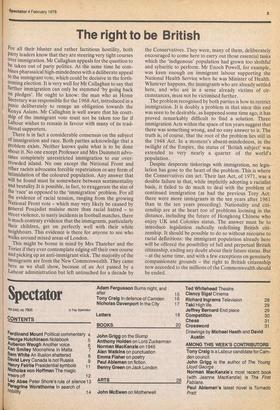The right to be British
For all their bluster and rather factitious hostility, both Party leaders know that they are steering very tight courses over immigration. Mr Callaghan appeals for the question to be taken out of party politics. At the same time he combines pharasaical high-mindedness with a deliberate appeal to the immigrant vote, which could be decisive in the forthcoming election. It is very well for Mr Callaghan to say that further immigration can only be stemmed 'by going back on pledges'. He ought to know: the man who as Home Secretary was responsible for the 1968 Act, introduced in a Panic deliberately to renege an obligation towards the Kenya Asians. Mr Callaghan is well aware that his courtship of the immigrant vote must not be taken too far if Labour wishes to remain in favour with many of its traditional supporters.
There is in fact a considerable consensus on the subject Of immigration and race. Both parties acknowledge that a Problem exists. Neither knows quite what is to be done about it. No one except Professor and Mrs Dummett advocates completely unrestricted immigration to our over crowded island. No one except the National Front and Other racists advocates forcible repatriation or any form of intimidation of the coloured population. Any answer that Will be found must lie somewhere between sentimentality and brutality it is possible, in fact, to exaggerate the size of the 'race' as opposed to the 'immigration' problem. For all the evidence of racial tension, ranging from the growing National Front vote — which may very likely be caused by general Poujadist malaise more than racial hatred — to street violence, to nasty incidents in football matches, there IS much contrary evidence that the immigrants, particularly their children, get on perfectly well with their white neighbours. This evidence is there for anyone to see who Walks around mixed areas of London.
This might be borne in mind by Mrs Thatcher and the Tories if they ever contemplate edging off their own course and picking up an anti-immigrant stick. The majority of the immigrants are from the New Commonwealth. They came here as we shall show, because of an Act passed by a Labour administration but left untouched for a decade by the Conservatives. They were, many of them, deliberately encouraged to come here to carry out those essential tasks which the 'indigenous' population had grown too slothful and sybaritic to perform. Mr Enoch Powell, for example, was keen enough on immigrant labour supporting the National Health Service when he was Minister of Health. Whatever happens, the immigrants who are already settled here, and who are in a sense already victims of circumstances, must not be victimised further.
The problem recognised by both parties is how to restrict immigration. It is doubly a problem in that since this end was seen to be desirable, as happened some time ago, it has proved remarkably difficult to find a solution. Three immigration Acts within the space of ten years suggest that there was something wrong, and no easy answer to it. The truth is, of course, that the root of the problem lies still in the 1948 Act. In a moment's absent-mindedness, in the " twilight of the Empire, the status of 'British subject' was extended to very nearly a quarter of the world's population.
Despite desperate tinkerings with immigration, no legislation has gone to the heart of the problem. This is where the Conservatives can act. Their last Act, of 1971, was a double failure in that, while implicitly adopting a racialist basis, it failed to do much to deal with the problem of continued immigration (as had the previous Tory Act: there were more immigrants in the ten years after 1961 than in the ten years preceding). Nationality and citi zenship are at the heart too of problems looming in the distance, including the future of Hongkong Chinese who enjoy UK and Colonies status. The answer must be to introduce legislation radically redefining British citi zenship. It should be possible to do so without recourse to racial definitions: the immigrant population already here will be offered the possibility of full and perpetual British citizenship, ending any doubt about their future status. But — at the same time, and with a few exceptions on genuinely compassionate grounds — the right to British citizenship now accorded to the millions of the Commonwealth should be ended.


































 Previous page
Previous page